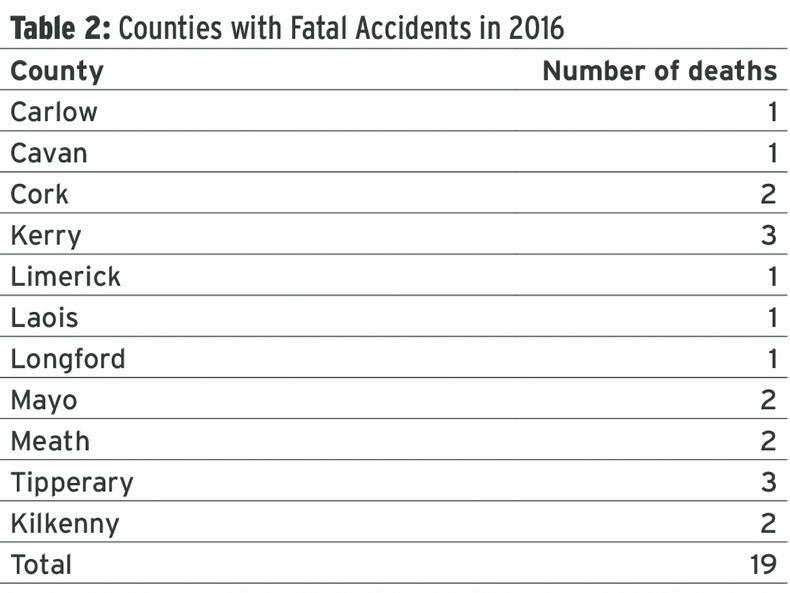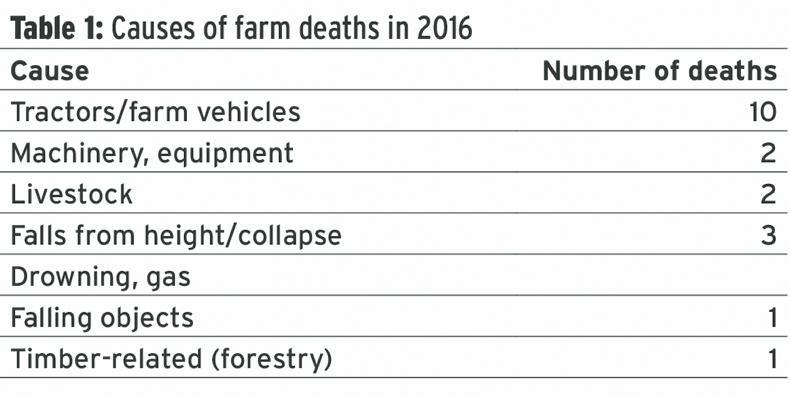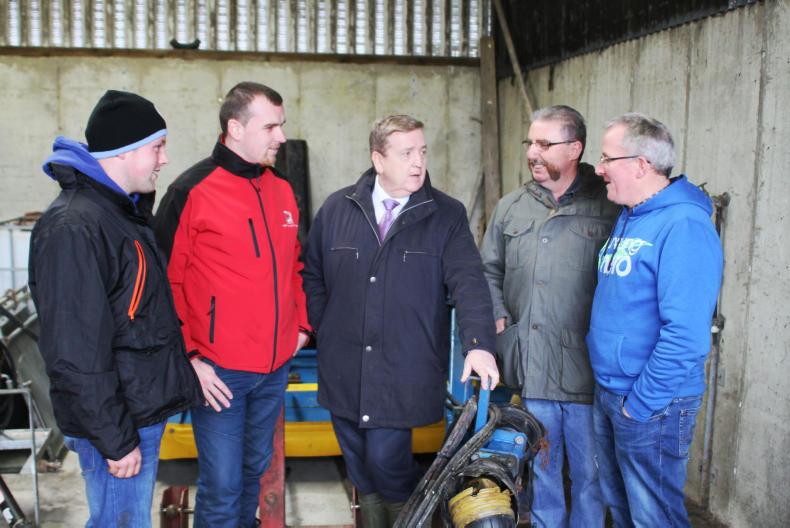Minister for Employment and Small Business Pat Breen voiced his concern at the sharp increase in fatal farm accidents while attending a farm safety walk in Co Clare on Monday.
Minister Breen pointed out that the number of people killed in farm accidents far exceeded workplace fatalities in other sectors of the economy.
Farming accounted for almost half (19) of all work-related fatalities (39) recorded so far this year, even though the sector employs only 6% of the country’s workforce.
This is a recurring theme, with statistics from the Health and Safety Authority (HSA) showing that you are eight times more likely to die working on a farm in Ireland than in the general working population.
Listen to interviews with participants in the farm safety walk including Minister Breen, HSA farm safety inspector David Boland and host farmer Martin Fennell in our podcast below:
Listen to "Farm Safety walk in Co Clare" on Spreaker.
On average, 19 people are killed each year in farm-related workplace incidents and there have been 194 farming fatalities in the last decade. The year 2014 was the worst in over 20 years with 30 fatalities. There were 18 farm deaths in 2015.
“Since mid-November, there have been four people killed on farms, with 19 deaths in total so far this year,” said the Minister. “No other sector is experiencing that level of fatal accidents and it is greatly concerning to me that so many families are losing loved ones due to work activity.”
It is greatly concerning to me that so many families are losing loved ones due to work activity
“Only in the last few weeks, we’ve seen two farmers killed in Cork and one in Tipperary,” added the Minister.

He appealed to farmers to take some time to consider the risks in every job they do and to work out a plan to manage the hazards before they start work.
“Farming is a way of life as well as an industry and we must remember that it is not the farmer that is at risk, but family members too. I believe that we must all work together as a community, along with the HSA and Teagasc, to reduce these tragedies. Farm safety walks are an excellent example of this. They encourage farmer-to-farmer learning and promote safer farming,” he added.
Chair of the Farm Safety Partnership Professor Jim Phelan called on farmers to commit to making changes in how they approach farm safety: “These events give the HSA and Teagasc an opportunity to meet with farmers in one location and give practical advice on farm safety.
Safety is not something you just talk about, it is something you must build into your work every day
“We know that farmers are receptive to the message that safety is vital, but we need to see that manifest in how they approach their work,” said Phelan. “Safety is not something you just talk about, it is something you must build into your work every day.”
He added: “The cost is just too high.”
The walk on the farm of Martin Fennell, a suckler farmer in Ballyket, Kilrush, Co Clare, was organised by the HSA and Teagasc and is designed to give local farmers an opportunity to learn first-hand about the practicalities of safety.
Five people have been killed in farm accidents in Co Clare in the last five years, according to John Kennedy of the HSA.
Key areas for farm health and safety
Four key areas for health and safety were addressed at the farm walk; tractors and machinery, livestock handling, farm buildings and slurry management.

During the walk, farmers were advised on risks around tractor use, changing and maintaining PTO guards, vehicle safety – including a SAFE STOP procedure – and the additional risks involved when carrying out maintenance work. Examples of good practice, such as yard layout and lighting, cattle handling facilities and adequate calving facilities, were also on show.
Farmers were encouraged to take more care when working at height, to use the appropriate equipment such as a mobile elevated work platform (MEWP) and not to take risks particularly while carrying out maintenance on fragile roofs. The importance of removing livestock and only carrying out slurry agitation on a windy day was also emphasised.
National health and safety specialist with Teagasc John McNamara said that knowledge transfer (KT) is becoming important in all aspects of farming: “Farm walks and knowledge transfer groups are about establishing networks so farmers can learn from each other. They are integral to much of what we, in Teagasc, are working towards.”
For more on this story, read the Irish Farmers Journal this week
Minister for Employment and Small Business Pat Breen voiced his concern at the sharp increase in fatal farm accidents while attending a farm safety walk in Co Clare on Monday.
Minister Breen pointed out that the number of people killed in farm accidents far exceeded workplace fatalities in other sectors of the economy.
Farming accounted for almost half (19) of all work-related fatalities (39) recorded so far this year, even though the sector employs only 6% of the country’s workforce.
This is a recurring theme, with statistics from the Health and Safety Authority (HSA) showing that you are eight times more likely to die working on a farm in Ireland than in the general working population.
Listen to interviews with participants in the farm safety walk including Minister Breen, HSA farm safety inspector David Boland and host farmer Martin Fennell in our podcast below:
Listen to "Farm Safety walk in Co Clare" on Spreaker.
On average, 19 people are killed each year in farm-related workplace incidents and there have been 194 farming fatalities in the last decade. The year 2014 was the worst in over 20 years with 30 fatalities. There were 18 farm deaths in 2015.
“Since mid-November, there have been four people killed on farms, with 19 deaths in total so far this year,” said the Minister. “No other sector is experiencing that level of fatal accidents and it is greatly concerning to me that so many families are losing loved ones due to work activity.”
It is greatly concerning to me that so many families are losing loved ones due to work activity
“Only in the last few weeks, we’ve seen two farmers killed in Cork and one in Tipperary,” added the Minister.

He appealed to farmers to take some time to consider the risks in every job they do and to work out a plan to manage the hazards before they start work.
“Farming is a way of life as well as an industry and we must remember that it is not the farmer that is at risk, but family members too. I believe that we must all work together as a community, along with the HSA and Teagasc, to reduce these tragedies. Farm safety walks are an excellent example of this. They encourage farmer-to-farmer learning and promote safer farming,” he added.
Chair of the Farm Safety Partnership Professor Jim Phelan called on farmers to commit to making changes in how they approach farm safety: “These events give the HSA and Teagasc an opportunity to meet with farmers in one location and give practical advice on farm safety.
Safety is not something you just talk about, it is something you must build into your work every day
“We know that farmers are receptive to the message that safety is vital, but we need to see that manifest in how they approach their work,” said Phelan. “Safety is not something you just talk about, it is something you must build into your work every day.”
He added: “The cost is just too high.”
The walk on the farm of Martin Fennell, a suckler farmer in Ballyket, Kilrush, Co Clare, was organised by the HSA and Teagasc and is designed to give local farmers an opportunity to learn first-hand about the practicalities of safety.
Five people have been killed in farm accidents in Co Clare in the last five years, according to John Kennedy of the HSA.
Key areas for farm health and safety
Four key areas for health and safety were addressed at the farm walk; tractors and machinery, livestock handling, farm buildings and slurry management.

During the walk, farmers were advised on risks around tractor use, changing and maintaining PTO guards, vehicle safety – including a SAFE STOP procedure – and the additional risks involved when carrying out maintenance work. Examples of good practice, such as yard layout and lighting, cattle handling facilities and adequate calving facilities, were also on show.
Farmers were encouraged to take more care when working at height, to use the appropriate equipment such as a mobile elevated work platform (MEWP) and not to take risks particularly while carrying out maintenance on fragile roofs. The importance of removing livestock and only carrying out slurry agitation on a windy day was also emphasised.
National health and safety specialist with Teagasc John McNamara said that knowledge transfer (KT) is becoming important in all aspects of farming: “Farm walks and knowledge transfer groups are about establishing networks so farmers can learn from each other. They are integral to much of what we, in Teagasc, are working towards.”
For more on this story, read the Irish Farmers Journal this week








 This is a subscriber-only article
This is a subscriber-only article











SHARING OPTIONS: